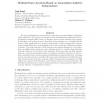11 search results - page 1 / 3 » Small Domain Randomization: Same Privacy, More Utility |
PVLDB
2010
13 years 3 months ago
2010
Random perturbation is a promising technique for privacy preserving data mining. It retains an original sensitive value with a certain probability and replaces it with a random va...
ACSC
2008
IEEE
13 years 11 months ago
2008
IEEE
We propose a more efficient privacy preserving set intersection protocol which improves the previously known result by a factor of O(N) in both the computation and communication c...
STOC
2009
ACM
14 years 5 months ago
2009
ACM
A mechanism for releasing information about a statistical database with sensitive data must resolve a trade-off between utility and privacy. Publishing fully accurate information ...
SDM
2008
SIAM
13 years 6 months ago
2008
SIAM
In this paper we explore private computation built on vector addition and its applications in privacypreserving data mining. Vector addition is a surprisingly general tool for imp...
JAIR
2010
13 years 3 months ago
2010
We develop multiattribute auctions that accommodate generalized additive independent (GAI) preferences. We propose an iterative auction mechanism that maintains prices on potentia...

